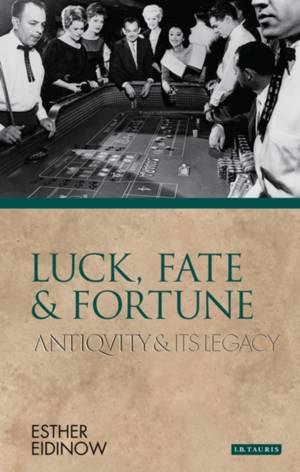
- Afhalen na 1 uur in een winkel met voorraad
- Gratis thuislevering in België vanaf € 30
- Ruim aanbod met 7 miljoen producten
- Afhalen na 1 uur in een winkel met voorraad
- Gratis thuislevering in België vanaf € 30
- Ruim aanbod met 7 miljoen producten
Omschrijving
The impulse to try to anticipate the future, and make sense of apparently random events, is irrepressible. Why and how the ancient Greeks tried to foretell the outcome of the present is the subject of Esther Eidinow's lively appraisal, which explores the legacy of ancient Greek notions of luck, fate and fortune in our own era, drawing on approaches to cognitive anthropology. Perhaps the most famous of all sites of prediction is the Oracle at Delphi. But the Delphic Oracle is only the best-known example from a landscape covered by oracular sanctuaries; while across the literary genres of antiquity there are myriad tales - such as that of doomed Oedipus - which wrestle with the cruel vicissitudes of fate and fortune. Exploring some of the key ideas of ancient Greek culture that resonate with modern conceptions of destiny, Eidinow examines the ancients' notion of luck as a means to explain daily experiences. Focusing on writers such as Homer, Herodotus, Thucydides and Demosthenes, the author shows how concepts of fate in antiquity changed over time, in response to social and political currents.
She draws too on modern cultural texts like "Terminator 2" and "Lawrence of Arabia", demonstrating how the recurring questions 'what if?' and 'why me?' are fundamental to the human relationship with an uncertain future, whether it be in the ancient past or the present day.
Specificaties
Betrokkenen
- Auteur(s):
- Uitgeverij:
Inhoud
- Aantal bladzijden:
- 224
- Taal:
- Engels
- Reeks:
Eigenschappen
- Productcode (EAN):
- 9781845118426
- Verschijningsdatum:
- 10/01/2019
- Uitvoering:
- Hardcover
- Formaat:
- Genaaid
- Afmetingen:
- 140 mm x 218 mm
- Gewicht:
- 408 g

Alleen bij Standaard Boekhandel
Beoordelingen
We publiceren alleen reviews die voldoen aan de voorwaarden voor reviews. Bekijk onze voorwaarden voor reviews.








